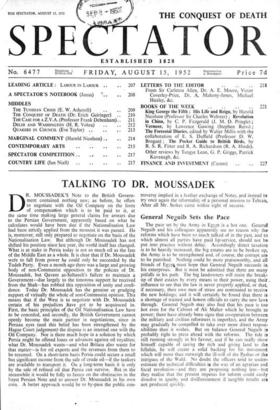General Neguib Sets the Pace
The pace set by the Army in Egypt is a hot one. General Neguib and his colleagues apparently see no reason why the reforms which have been so much talked of in the past, and to which almost all parties have paid lip-service, should not ho put into practice without delay. Accordingly direct taxation is to be heavily increased, the big estates are to be broken up, the Army is to be strengthened and, of course, the corrupt are to be punished. Nothing could be more praiseworthy, and all friends of Egypt must hope that General Neguib succeeds in his enterprises. But it must be admitted that there are many pitfalls in his path. The big landowners will resist the break- up of their estates by every means in their power, using their. influence to see that the law is never properly applied, or that, if necessary, their own men of straw are nominated to receive the new holdings; and it will certainly be found that there is a shortage of trained and honest officials to carry the new laws through. General Neguib may also find that his pace is too hot even for the Cabinet of All Maher which he brought to power; there have already been signs that co-operation between the military and civilian reformers is imperfect, and the Army may gradually be compelled to take over more direct respon- sibilities than it wishes. But on balance General Neguib is probably right to press ahead with the reforms. The tide is still running strongly in his favour, and if he can really show himself capable of taxing the rich and giving land to the fellahin, he will create a solid backing for his movement which will more than outweigh the of the pashas or the intrigues of the Wafd. No doubt the officers tend to under- estimate the technical difficulties io the way of an agrarian and fiscal revolution—and they are proposing nothing less—but they realise that the present impetus for reform could easily dissolve in apathy and disillusionment if tangible results aro not produced quickly.


























